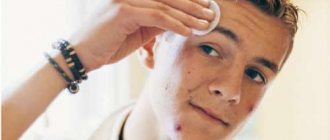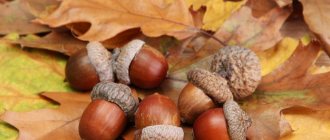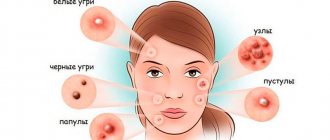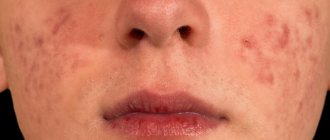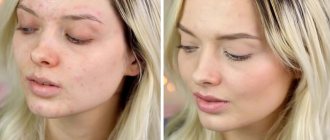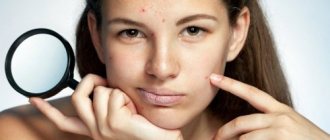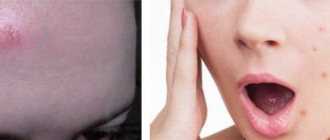July 18, 2012
Why does exam stress make teenage acne worse? How should teenagers with acne eat?
Have your first pimples appeared? You are not alone. Experts believe that almost all teenagers sooner or later suffer from these annoying skin rashes. Acne affects boys and girls equally, regardless of gender or ethnicity. Teenage acne, or as dermatologists call it, teenage acne
, first appear between the ages of ten and thirteen years. Most often, the process begins in the nose area and then spreads to the forehead, chin and cheeks. Sometimes acne appears on the neck, shoulders, chest and back. In most cases, acne problems disappear on their own by the age of twenty. However, acne can also appear in later life. A quarter of adult men and half of adult women experience skin rashes from time to time.
Is it just hormones?
Let's keep calm
Exams are a serious stress for a teenager. Find out how to help a young student survive the first session without getting stressed yourself.
One of the common myths is that acne is exclusively a hormonal problem, which means it is useless to fight it.
This is wrong. Indeed, the change in the hormonal background of the body, which occurs at the beginning of puberty, also affects the condition of the skin. Hormones stimulate the activity of the skin's sebaceous glands, causing them to produce more secretions. Excess sebum becomes the basis for the proliferation of bacteria, which cause inflammation in the sebaceous glands clogged with secretions. However, in addition to the hyperreactivity of the sebaceous glands, scientists often identify other additional factors
for the appearance of acne: stress, poor diet and addiction to acne products, which cause excessive dryness, peeling and irritation of the skin. Excessive use of such cosmetics provokes the appearance of new acne and slows down the healing of old ones.
Dermatologist Ekaterina Khachatryan: “There is no connection between intestinal microflora and acne!”
— What skin problems do teenagers, from 11 to 18 years old, most often encounter?
- Either this is an exacerbation of chronic skin diseases that existed previously, for example, atopic dermatitis, psoriasis, or it is acne.
— What is acne?
— In medicine, this term is used to define acne and pimples. Acne is a chronic inflammatory skin disease predominantly of the face and upper third of the torso, although it can be a more common process. True, the word “teenage” is no longer used. There are patients whose acne actually goes away with adolescence, and there are those whose problem remains. And for some it may occur already in adulthood, after 25 years.
— Is it actually just a rash or do a couple of pimples count as well?
- Even the appearance of single blackheads is, in fact, acne. These points are a blockage of the sebaceous gland. In it, sebum oxidizes under the influence of oxygen and becomes black. Everyone's acne progresses differently, and recommendations and treatment depend on this.
— Does the course of acne differ between boys and girls?
- In girls, although not all, there may be a connection between the exacerbation of rashes and the day of the menstrual cycle. But there is no fundamental difference. In adolescence, acne occurs more often in boys; in adulthood, this condition more often accompanies women.
— Is the occurrence of acne associated with changes in hormonal levels?
— People with this problem, in principle, always have a connection with hormonal changes. In all of us, the activity of the sebaceous glands is formed due to the action of sex hormones. In particular, androgens affect the functioning of the sebaceous glands. The sebaceous glands of patients with acne are more sensitive to androgens than those of people without this feature. And yes, most skin diseases can worsen during puberty. During adolescence, a change in the ratio of sex hormones leads to an increase in the work of the sebaceous glands. However, donating blood for hormones in adolescents with acne is not mandatory.
— When do you need to donate blood for hormones?
— If there are any other symptoms, for example, a girl has male-type hair growth on her chest, and a boy has gynecomastia (enlargement of the mammary gland with hypertrophy of the glands and adipose tissue - editor's note). Then it is necessary to clarify whether everything is in order with sex hormones, so as not to miss diseases associated with their incorrect ratio.
- But why do some people develop acne in adolescence, while others do not? What does this depend on?
- From genetic predisposition, greater activity of the sebaceous glands initially, skin sensitivity, which itself is more prone to inflammation. Plus a change in skin microflora. In people with a predisposition to acne, more bacteria live on it, which can support and provoke inflammation.
— That is, if parents had skin problems in adolescence, will their children have them too?
- With 100% probability we cannot talk. But there are studies that confirm this relationship (you can read them in English here, here and here - editor's note).
- And if acne appears in pre-teenage...?
- Such acne may be associated with the risk of concomitant hyperandrogenic conditions. For example, congenital adrenal hyperplasia, an androgen-producing tumor. If acne appears in a child between the ages of 1 and 7, we must check it.
Stress
Any teenager who suffers from acne knows the stress that a pimple right on the tip of the nose can cause. Unfortunately, dermatologists say that psychological stress only makes the problem worse. Thus, Singaporean scientists believe that before an exam in teenagers, the number of acne increases by about 23 percent compared to the holiday period. Researchers believe this process is not due to increased sebum production or teens forgetting about personal hygiene. In their opinion, stress can provoke inflammatory processes, including on the skin.
How long does it take for skin to heal after acne?
Poll: When did your acne appear? (Number of votes: 4295)
I've been suffering all my life
It's been a couple of years now
About a few months
Recently
To vote, click on the desired answer. results
How long it takes for the skin to regain its tone, health and beauty from acne to clear depends on many factors. Some people's acne clears up after adolescence and with a little treatment, goes away forever and irrevocably. However, most people are not very lucky.
Most people need some form of treatment for teenage acne to fully heal their acne and its aftermath. It's worth knowing that there is no cure for acne, but it can be eliminated with the right treatment.
How long does puberty and acne last?
For most people, teenage acne can finally go away only at the age of 25 years; the number of acne decreases significantly between the ages of 18 and 20, respectively. This is due to the fact that at this age, hormonal processes in the body begin to be gradually controlled, establishing a constant hormonal balance, and oily teenage skin begins to transform into drier adult skin.
Nutrition
The existence of a connection between the occurrence of acne and the abuse of sweets has long been considered a myth.
However, scientists have found some evidence of how an unhealthy diet affects skin condition. Thus, Australian scientists believe that consumption of carbohydrates with a high glycemic index, which sharply increase the concentration of glucose and insulin in the blood, can provoke the development of acne. But a diet rich in valuable proteins and carbohydrates with a low glycemic index, on the contrary, helps reduce the amount of acne. How should teenagers suffering from acne eat: 1. Avoid fast food and foods containing added sugar. You will also have to say no to sweet soda. 2. Love whole grain bread, durum wheat pasta, brown rice and all types of unsweetened porridge. 3. Eat at least five fruits and at least three servings of fresh vegetables every day. 4. Instead of hamburgers, choose lean meat, cottage cheese, dairy products and fish. And do this not occasionally, but every day. Youth without extra pounds
In adolescence, children are worried not only about acne, but also about excess weight. Remember, a teenager’s weight is a parent’s concern. How to help a child lose weight, says the chief physician of the Treatment and Rehabilitation Center of the Ministry of Health and Social Development of Russia, Tatyana Shapovalenko.
Scientists promise that by adhering to such a diet, a teenager will not lose anything except acne and extra pounds, which poison life no less than acne.
Causes and symptoms of acne at different ages
According to official data, there are no clear differences between the course of acne in adults and adolescents, but the clinical picture indicates a number of pathogenic factors that are typical for women92:
- genetic factors;
- stress;
- influence of ultraviolet radiation;
- obesity;
- increased level of atherogenic lipoproteins in the blood;
- poor nutrition.
There may be other reasons for the appearance of acne in adolescents and adults:
- endocrine disorders;
- gynecological diseases;
- gastrointestinal diseases that provoke dysbacteriosis;
- use of cosmetics with comedogenic components;
- taking certain medications, such as corticosteroids.
To understand the causes of acne, you need to consult a specialist.
What contributes to the formation of a phobia
Acnephobia arises against the background of deep-seated pathological personality traits. If a child lacks recognition from significant loved ones, if he was not told that he has certain abilities and is distinguished by significant qualities, then against the background of low self-esteem he may develop a similar disorder. The teenager believes that he has nothing to interest his peers in a cognitive way, and “ugly” pimples on his face will completely push his comrades away from him.
The development of a phobia is also influenced by the relationship between parents and children, when adults place excessive emphasis on appearance. This model is more typical in raising girls. In this case, appearance is given special importance. Adults, often mothers, systematically repeat to their daughter that she must take care of herself, that ugly girls “do not fit in well in life.” From an early age, the child is allowed to undergo procedures that are unusual for his age.
Girls are terrified of ruining their appearance, including acne. Since acne is a fairly common disease of adolescence, young people are obviously afraid of becoming its owner. Suggestible individuals become victims of marketing. We are talking about advertisements for cosmetic products that promote getting rid of or preventing acne.
Manufacturers can play on consumer fears. Their task is to advertise the product being promoted in such a way that the buyer really believes in the existence of such a problem, and here there is just a “magic solution” to solve it. That is, the manufacturing company is betting on the fact that:
- there is a problem (acne). Perhaps the teenager would not have been obsessed with this thought to the point of exhaustion if he had not seen the advertisement;
- if you don’t take action, the consequences will be disastrous - if you don’t use our anti-acne lotion, you will soon be covered with them from head to toe. It’s exaggerated, but that’s the meaning;
- The way out is simple - buy a magic remedy in a store or on the Internet, and you won’t be afraid of any rashes.
Remember any advertisement for anti-acne lotions, gels, creams: a pimply teenager with horror and panic on his face. He doesn't go to the disco, but stays at home.
Once an unbalanced, sensitive brain sees a video like this, it develops fear. A fear is formed: if he develops acne, he will also have to remain in isolation.
On the other hand, phobia develops not only in adolescents, but also in older people.
Example: a young woman, 35 years old, works in a children's institution, suffers from acne, which has become chronic. She had already been suspended from work several times during periods of exacerbation of the disease. After another suspension, the girl received a warning. She will be forced to fire her because the work process suffers during her absence. It is more convenient for the administration to hire a new employee who will not be away so often. In this situation, a woman may develop acnephobia as a result of fear of losing her job.
Should teenage acne be treated*?
Acne is a common problem among teenagers, but many do not take it seriously, believing that it will go away with age. It must be remembered that we are talking about a serious dermatological disease that can ruin the appearance and lead to serious psychological problems. Many patients with acne experience difficulties communicating with other people and moving up the career ladder.
Psycho-emotional stress caused by acne is most pronounced in adolescents. Research shows that teenagers perceive peers with facial rashes as boring, consider them lonely, and shy. Schoolchildren with acne themselves suffer from low self-esteem, depression, and difficulties in communication. 46
There are even a number of mental pathologies associated with acne. These include hypochondria, anxiety disorders, eating disorders, body dysmorphomania, and even suicidal behavior. 46
With severe acne, atrophic scars remain on the skin. That is, even after overcoming acne, having achieved remission of the disease, the patient still does not get rid of aesthetic defects. Scars are extremely difficult to remove. To make them less visible (and in some cases this is the maximum that can be expected), it is necessary to undergo expensive cosmetic procedures, and one session is not enough, sometimes a whole course is needed.46
